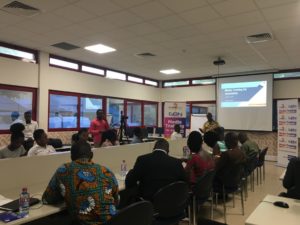Fact-checking must be a priority for journalists – Dogbevi
 A two-day training on fact-checking for Journalists has kicked off in Accra with a call on Journalists to prioritise fact-checking and verification before publication of news reports.
A two-day training on fact-checking for Journalists has kicked off in Accra with a call on Journalists to prioritise fact-checking and verification before publication of news reports.
The need for verification and fact-checking was important with the emergence and evolution of social media, which allowed both expert and non-experts to post information.
Speaking to the Ghana News Agency in an interview on the first day of the training session on the theme: “Getting the facts Right in the Era of Social Media” Mr. Emmanuel Dogbevi, Executive Director of NewsBridge Africa, and Editor of the Ghana Business News, organisers of the training, underscored that verification was indispensable to journalism.
The training was organised by the NewsBridge Africa with sponsorship from the Australian High Commission in Ghana,
According to him, Journalism was more of a science than an art, and as pertained in scientific research, facts published by journalists should be such that can be independently verified by third parties.
“Again, what Journalists publish have consequences for the bigger society. If you look at what happened, for instance in Rwanda, then you would understand why it is extremely important for Journalists to always get their facts correct,” he noted.
Mr. Dogbevi said most of the things that were posted on social media as news, did not come from professional journalists and this made it even more important for journalists using social media as a source of news to verify the sources and authenticity of such posts before using them.
While agreeing that social media could be a source of news for Journalists, he stressed that such information must be fact-checked, before publishing.
“Journalists should always go the extra mile to verify information to make sure that they save themselves the embarrassment of publishing fiction as news.”
He said the two-day workshop was important for Ghanaian Journalists to continually update their skills through training irrespective of what they know to be abreast with new developments in their field.
“In any case, the breaking of the Panama papers in 2016 has shown that there is a completely new direction that Journalism is going and Ghanaian Journalists ought to learn to understand what is going on globally and see how they can also adapt to meet global standards in reporting,” he added.
The workshop will cover topics including how to check for facts, social media for journalists, and storytelling among others.
The 20 participants will also undertake practical exercises on fact-checking.
Fact-checking has become very prominent, especially in the United States, with the increased use of social media such as Twitter by news sources.
Some Journalists in the United States, such as Washington Post reporter David Fahrenthold, who spent a year fact-checking claims made by then candidate Donald Trump to have given millions of dollars to charity and Politifact, a fact-checking website dedicated to rating the accuracy of claims made by politicians and other sources show the rising need for fact-checking and verification.
Source: GNA
